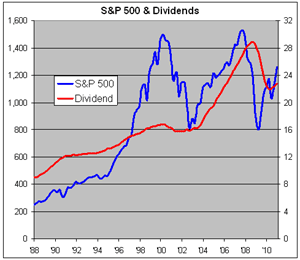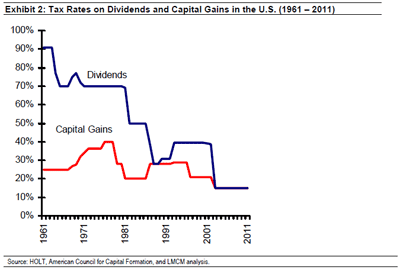There is always plenty of talk about which candidate is going to do do what to upstanding tax payers, and we're in that frenzy right now, so just keep it all out and pick good stocks, writes Jim Trippon of Dividend Genius.
The market always tries to be forward looking, to get ahead of what might happen. If individual investors try to use that strategy, it can go mainly two ways:
- one, it can be proactive and help traders and investors avoid disasters
- or two, it can make traders and investors make moves in response to things that never happen
Such is the context right now for the buzz regarding the possible dividend tax hike. There is already a lot of consternation about reading the future of dividend tax rates. Whether this is something that investors need to address now to make an adroit move on already or whether it's going to be a phantom, an investing head fake and feint which can take investors out of position, is up in the air.
Currently, as most dividend investors are keenly aware, dividends are taxed at a cap of 15%. A series of tax reductions which began in 2003 and have been extended through the end of 2012 puts the rate there. If Congress does nothing and lets these measures expire, the dividend rate is set to jump to the highest marginal rate for high income earners, 39.6%.
In addition, with the added 3.8% health-care tax on investment income which was added in 2009, this would bring the potential for a high income earner to pay as much as 43.4% on dividends. No wonder investors are concerned.
Dividend Stocks' Performance
The S&P 500 returned 2.1% in 2011, while the Dow Jones US Select Dividend Index returned 12.1%. So dividend paying stocks were in something of a sweet spot.
This year, dividend stocks have been lagging the broader market as the first quarter of 2012 has ended. Despite the strong performance of dividend-paying stocks last year, however, yields were not, on average, jumping out at investors.
The S&P 500 was yielding just over 2% on average, less than its historical average. With the US economy improving in the last couple of quarters, there may be a greater willingness for companies to boost dividends this year. Some estimates project the overall increase to be in the 10% to 15% range.
It's not alarmist to suggest that a large number of dividend investors are concerned about the potential changes in the dividend tax.
It is estimated that investors over the age of 65 accounted for more than 40% of dividend income, according to IRS data from a recent year. Obviously, income investors who depend on dividend income as some percentage of their retirement money are a significant group.
|pagebreak|There are even Web sites devoted to gaining support of Congress to extend the current 15% dividend tax rate cap. There is some speculation that companies would find it less attractive to raise their dividends if they felt that investor sentiment for dividend stocks were to fall off due to a possible tax hike.
On the other hand, companies are still flush with cash, and many investors still clamor for dividends. The recent Apple (AAPL) event initiating a dividend is the most graphic illustration of that. Also, while dividends may be taxed at the rate of ordinary income, many income investors are not in the top income brackets, so they would be less affected by the rate hike.
While some investors have suggested complicated options strategies to hedge by playing the downside of dividend stocks' share prices in the event of the tax hike, this can be both costly and too involved for most investors.
Still, cash is cash, and anything that diminishes the income stream for dividend investors is not only unwelcome, but will have some effect on making many dividend stocks less attractive, if even only slightly so. Companies growing their dividends, however, may mitigate this.
Even if the market's reaction if the dividend tax hike goes through would be to make some of the dividend stocks less attractive, there's no evidence that there would be a wholesale abandonment of dividend stocks, nor should there be. Perhaps prudent trimming and pruning of dividend portfolios would be in order, but that should always be the case.
It will once again make stock picking paramount, even for income investors, as they will want to position themselves for the best yields from quality stocks. Also, coordinating a dividend portfolio within an overall tax plan is something that's suggested even now, as we are in tax season.
Subscribe to Dividend Genius here...
Related Reading:












